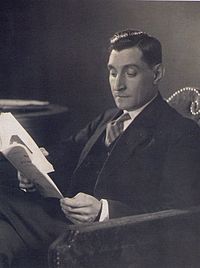António de Oliveira Salazar Politician
António de Oliveira Salazar GCSE, GCIC, GCTE, GColIH (Portuguese pronunciation: [ɐ̃ˈtɔniu dɨ oliˈvɐjɾɐ sɐlɐˈzaɾ]; 28 April 1889 – 27 July 1970) was a Portuguese professor and politician who served as Prime Minister of Portugal from 1932 to 1968. His Council of Ministers briefly served as acting President of the Republic in 1951; he was never President of the Republic, but was the virtual dictator of the country in the manner of Spain's Francisco Franco and Italy's Benito Mussolini. He founded and led the Estado Novo (New State), the authoritarian, right-wing government that presided over and controlled Portugal from 1932 to 1974. In 1940, Life called Salazar "the greatest Portuguese since Prince Henry the Navigator" and Oxford University conferred him the Honorary Degree of Doctor of Civil Law.Opposed to communism, socialism, anarchism and liberalism, Salazar's rule was corporatist, conservative, and nationalist in nature, defending Portugal as Catholic. Its policy envisaged the perpetuation of Portugal as a pluricontinental nation under the doctrine of lusotropicalism, with Angola, Mozambique, and other Portuguese territories as extensions of Portugal itself, with Portugal being a source of civilization and stability to the overseas societies in the African and Asian possessions.Historian Neill Lochery claims Salazar was one of the most gifted men of his generation and hugely dedicated to his job and country. According to Lord Templewood, Salazar was a learned and impressive thinker and a man of one idea, the good of his country. “Salazar detested Hitler and all his works” and his corporative state was fundamentally different from Nazism and Fascism. Historian Carlton Hayes, who met Salazar in person, also describes him as someone who “didn't look like a regular dictator. Rather, he appeared a modest, quiet, and highly intelligent gentleman and scholar (...) literally dragged from a professorial chair (...) to straighten out Portugal's finances.” Salazar lived a life of simplicity, dying as a poor man after 40 years of public service. Portuguese right-leaning or conservative scholars like Jaime Nogueira Pinto and Rui Ramos, claim his early reforms and policies allowed political and financial stability and therefore social order and economic growth, after the politically unstable and financially chaotic years of the Portuguese First Republic. Even the communist historian, António José Saraiva, a lifelong opponent of Salazar, recognizes that “Salazar was undoubtedly one of the most remarkable men in the history of Portugal and had a quality that not all remarkable men have: the right intention”.On the other hand, historians like leftist politician Fernando Rosas claim that Salazar's policies from the 1930s to the 1950s led to economic and social stagnation and rampant emigration, turning Portugal into one of the poorest countries in Europe, however, recognizing "that industrial growth throughout the 1950s and 1960s was generally quite positive and, given Portugal's basic problems, could probably have only been improved slightly by a more creatively liberal regime". From 1960 until Salazar's death economic growth and levels of capital formation were characterized by unparalleled robust annual growth rates of GDP (6.9 percent), industrial production (9 percent), private consumption (6.5 percent), and gross fixed capital formation (7.8 percent).In March 2007, Salazar was elected the "Greatest Portuguese Ever" with 42% of votes on the RTP1 TV show Os Grandes Portugueses as well as "Worst Portuguese Ever" on the parody TV show "Axis of Evil" from rival channel SIC Notícias.
Search
Office holder
| office | Minister of Defence Minister of Finance (interim) 100th Prime Minister of Portugal Minister of the Colonies President of Portugal (interim) |
|---|---|
| party | |
| president | |
| prime minister | |
| successor | Eduardo Augusto Marques Filomeno da C%C3%A2mara de Melo Cabral Gomes de Ara%C3%BAjo Jo%C3%A3o Pinto da Costa Leite 4th Conde de Lumbrales |
António de Oliveira Salazar on Wikipedia
External resources
- http://books.google.com/books/about/Ambassador_on_Special_Mission.html?id=w0vPAAAAMAAJ&redir_esc=y
- http://books.google.es/books/about/Salazar.html?id=hewsI4PU6sMC&redir_esc=y
- http://books.google.es/books?id=CPN_QgAACAAJ&dq=egerton+salazar&hl=es&sa=X&ei=L8OMU9HHBcvisASUk4L4Dg&ved=0CDkQ6AEwAQ
- http://libro.uca.edu/payne2/index.htm
- http://www.brown.edu/Departments/Portuguese_Brazilian_Studies/ejph/html/issue19/html/v10n1a04.html
- http://www.jstor.org/stable/1188572
- http://www.jstor.org/stable/2602248
- http://www.jstor.org/stable/3513163
- http://www.jstor.org/stable/41105184
- http://yad-vashem.org.il/odot_pdf/Microsoft%20Word%20-%203230.pdf
